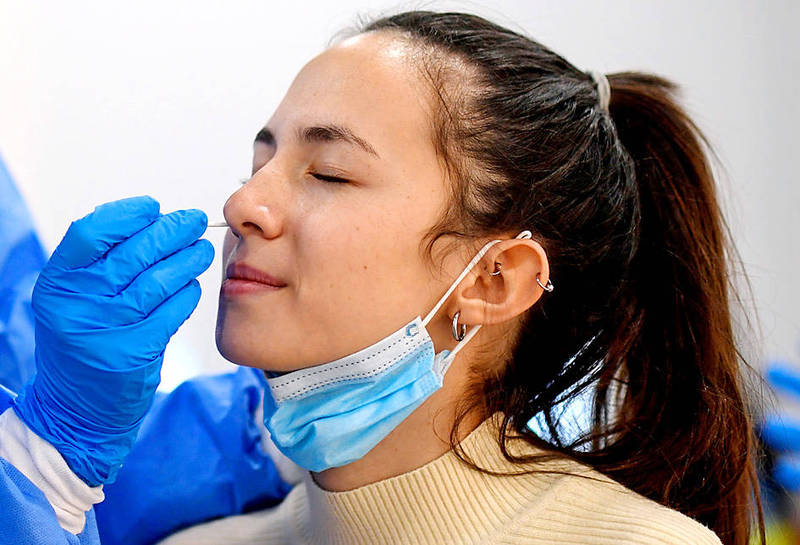《TAIPEI TIMES》 COVID-19-sniffing robots offer testing alternative to swabs

A medical worker takes a swab sample from a woman at the Lope de Vega Cultural Center in Madrid on Thursday. Photo: AFP
By Kristen V Brown / Bloomberg
A biotechnology start-up called Koniku Inc is trying to develop robots that could sniff out COVID-19 infections faster than conventional testing.
The technology fuses neurons with a silicon chip to create a “smell cyborg” capable of detecting scents ranging from explosives to pathogens.
Koniku’s first clinical trial began three weeks ago and would examine samples from patients tested for COVID-19 to compare how well the smell-bot detects the virus compared with traditional methods.
Small internal trials have already demonstrated that it can accurately detect the presence of influenza A.
“Our goal is to have a device that merges synthetic biology with silicon and maps all of the smells of human life on a global scale,” said Oshiorenoya Agabi, the San Rafael, California-based company’s chief executive officer and cofounder. “We should have a device in every home in America to screen for disease.”
Pathogens produce unique volatile organic compounds, scent-fingerprints of a sort, released by ailing cells. These signature smells are the same biological clues that allow dogs to sniff out dozens of diseases. Finland last month tested the ability of dogs to detect COVID-19 in a trial at Helsinki’s airport.
Some researchers have suggested that using dogs could be cheaper, faster and even potentially more effective in screening for the disease than methods including temperature checks, nasal swabs and saliva.
In July, German researchers showed that trained dogs were able to distinguish between saliva sampled from people infected with the virus and those who were not more than 90 percent of the time.
Koniku’s device, the Konikore, is slightly smaller than a frisbee and resembles a flying saucer. When the proteins in its chip bind to a scent it has been programmed to detect, cells amplify and process those signals with help from machine learning, and the device lights up.
In a field test in Alabama, it was able to detect explosives better than trained dogs. The test was conducted by law enforcement officials and aerospace giant Airbus SE, a Koniku investor and partner that has been working to roll out the technology in airports.
Koniku plans to conduct field trials with Airbus at Changi Airport in Singapore and then San Francisco International Airport later this year.
“If a dog can smell it, we can,” said Agabi, who described the Konikore as a “smell camera.”
He imagines the technology could be useful far beyond bombs and diseases.
For example, it could digitize the taste of food, allowing for the synthetic recreation of things like bacon, he said.
Koniku’s merger of biology and computing technology — often termed “wetware” — is a growing field. The company’s investors include Softbank Group Corp, Platform Capital Group, Halfcourt Ventures LLC, Changi Airport and Airbus’ venture capital arm.
Koniku has hired Treximo LLC, a biotech consulting and project management company, to conduct its trials for SARS-CoV-2. Trials for new devices are typically far faster and less intensive than those for new drugs.
Treximo said it expects it would be done with the necessary steps to apply for an emergency-use authorization with the US Food and Drug Administration in the first quarter of next year.
“We know this device can smell explosives, but can we have it pick up organic compounds in human breath to say yes or no does this person have SARS-CoV-2?” Treximo chief executive officer Michael Stomberg said. “It’s a game-changing device if it proves to be valid.”
The devices are to go on pre-sale for hardware developers this week.
After COVID-19, Agabi imagines the company pursuing other diseases insurance companies might be inclined to cover the cost of a test for, such as lung cancer.
If successful, it could be used not just in homes, but for mass detection of diseases and pathogens in public spaces.
“Telehealth is growing,” Agabi said. “Our goal is not another Zoom application, but to actually bring technology closer to people to be able to screen disease in real time.”
新聞來源:TAIPEI TIMES
















